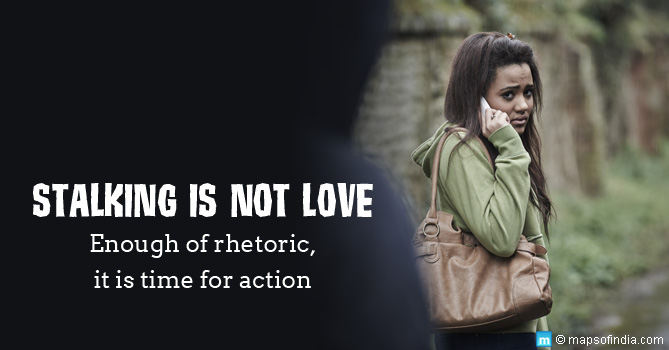Delhi, the capital of India, has been making it to the headlines for all the wrong reasons in the recent past. While it has been recognised as the Rape Capital of India, as per the data collected by National Crime Records Bureau in 2015, Delhi is also second among Indian states in terms of number of stalking cases registered. It is unfortunate, but the Capital of India, which represents India on the international platform is now the most unsafe place for women to reside in.
Stalking Cases
- 1,124 cases of stalking under Section 354D of the Indian Penal Code has been recorded in the Union Territory of Delhi in the past 1 year. This constitutes 18% of all the complaints received in India, and 97% of all such complaints from the Union Territories.
- Delhi comes second to Maharashtra where 1,399 stalking cases were registered.
- However when compared the sex ratio in Delhi is lesser than Maharashtra, meaning while Maharashtra has 929 women to every 1000 men, Delhi has only 868 women to every 1000 men.
- Delhi is worse than even the states perceived as the most unsafe for women, like Uttar Pradesh.
Aftermath of the Stalking Cases in the Recent Past in Delhi
- In August, 2016, a 23-year old girl was set ablaze by a stalker because she turned down his proposal. She received 95% burns
- On 20th September, 2016, a 22-year old woman, Karuna, a resident of Burari area in north Delhi, was stabbed 22 times by a stalker who claimed to have been in a relationship with her. Karuna died on the spot.
- Just a day earlier, on the 19th of September, a 25-year-old beautician was pushed off a building in Delhi’s Mongolpuri area.
- The spiral of violence seems to be never ending with another 28-year-old woman stabbed to death by her stalker in Inderpuri.
- There are many other complaints which either get buried or the victim does not register a formal complaint, preferring an informal solution by talking to the culprit.
The Delhi Commission for Women chief Swati Maliwal wrote a letter to the Union home ministry pointing out the high rate of stalking crimes. “According to data of National Crime Record Bureau (NCRB) for 2015, Delhi is not just rape capital but also stalking capital.”
What is Stalking? Is it Illegal?
Stalking has been defined as the “act of pursuing or approaching stealthily” in the Webster’s Dictionary. Under the legal parameter stalking is a course of conduct directed at a specific person that would cause a reasonable person to feel fear.
In India, Stalking was officially recognised as a crime only in 2013, with the Criminal Law (Amendment) Act, 2013, which amended Sec 354 of the Indian Penal Code dealing with Rape, and added a new Sections 354D. Sec 354D of the Indian Penal Code states that Stalking constitutes the following:
- Any man who follows a woman and contacts, or attempts to contact such woman to foster personal interaction repeatedly despite a clear indication of disinterest by such woman
- Any man who monitors the use by a woman of the internet, email or any other form of electronic communication, commits the offence of stalking.
Stalking here does not include:
- Any man following for the purpose of preventing or detecting crime and the man accused of stalking had been entrusted with the responsibility of prevention and detection of crime by the State
- Any man doing the act under any law or to comply with any condition or requirement imposed by any person under any law.
Punishment for Stalking under Sec354D Indian Penal Code
Whoever commits the offence of stalking shall be punished on first conviction with imprisonment of either description for a term which may extend to three years, and shall also be liable to fine; and be punished on a second or subsequent conviction, with imprisonment of either description for a term which may extend to five years, and shall also be liable to fine.
It has been three years since Stalking was officially recognised as a serious crime. However, even three years down the line, things are as grim, in fact worse in Delhi. The amendment came after Nirbhaya, a young college girl was brutally gang raped, but even today, the women in Delhi are as unsafe as they were 3 years back.
The apathy of law-enforcement officials and public alike is shocking. In the past one week every act of violence because of stalking, including the stabbing of Karuna on Tuesday, has not been committed in the dead of the night, but broad daylight. The onlookers have watched on and then have turned a blind eye and walked away from the scene of crime. This kind of a social and political indifference to one of the most dangerous crimes is indeed disheartening and frightening. Minister of State for Home Affairs Kiren Rijiju’s said “What has happened is very sad”. This weak and inadequate statement blatantly demonstrates a lack of empathy towards the plight of women out on the streets in Delhi. Do we need another Nirbhaya to happen for the police as well as the ministers to take a proper stock of things, and take action?
Stalking Glorified by Bollywood
Stalking is one of the most dangerous crimes and yet since the very beginning we, especially the women, have been conditioned not to react to it. Even Bollywood has glorified this depraved, amoral and filthy act. Movies like Raanjhanaa, Tere Naam, Besharam, Wanted and Sultan have had the public, men and women alike, rooting for the stalkers!!! Salman Khan tops the list of being a conditioned onscreen stalker. Is this the message that we want to give to the public through one of the most popular mediums; Cinema? Does not the problem of stalking begin with the idea embedded in the minds of young men hooting and whistling at Dhanush and Salman Khan while they are stalking the heroines on the silver screen? While the heroes in these movies turn out to be good men to appease the general public, who will take the responsibility of the young men stepping out of the movie hall with the idea of stalking the women of their choice. Of these young men, who knows how many are going to stab, throw acid, or try other acts of violence on the women when they are rejected?
A Guideline to be Safe
Women and young girls need to take a proportion of the matter of safety into their own hands. Here is a guideline for all the young women to be safe from stalking:
To begin with we have to understand the mind of a stalker. Stalkers are sick people. While they are generally lonely and lack self-esteem, they feel very important.
- The rejected stalker: These stalkers are the dangerous kinds. They feel cheated, rejected and perceive themselves as victims for having been rejected in a relationship. Many cases in India have come to the fore where a man has attacked his ex-partner for having been “dumped”. In case a woman wants to walk out of a relationship, it is best she does it amicably, and if that is not possible, she must disclose her secret to her family, so that her safety in case of retaliation can be ensured. Rejected stalkers normally seek vindication through acts of violence.
- The resentful stalker: There are some who are self-righteous, self-pitying people. They threaten, but generally do not act on it.
- The intimacy-seeking stalker: These are mentally ill and delusional men who believe that the woman they are stalking reciprocate the attraction that he feels. They believe stalking will help them win over the love of the woman.
- The incompetent stalker: Socially awkward, these stalkers do not even realise that what they are doing in wrong and illegal. These stalkers generally mean no harm and will stop once counselled.
- The predatory stalker: These are the worst kind of stalkers.The only agendas on the minds of these stalkers are sexual gratification, control, and violence. These stalkers are cunning and the victim does not even come to know she is being stalked until he strikes. The predatory stalker plans and rehearses before he strikes. In Delhi most of the cases have been that of a predatory stalker.
No matter what kind of stalker is involved, every woman needs to be aware and act towards her own safety. How can a woman confirm that she is being stalked?
- You receive repeated calls but when you pick the phone, the person hangs up.
- The same face seems to pop up wherever you go.
- You receive unwanted gifts, letters, texts and e-mails.
- You start seeing sudden damage to your property like vehicles, or a broken window glass in your house.
- You see the same car or motor bike drive by your house or place of work time and again with the driver looking towards your house.
- You get information from your friends that a person you do not know has been asking about you and your whereabouts.
- Any other action that is aimed at controlling, tracking and frightening you.
Protect yourself
- Trust your instinct. If you have been feeling unsafe, you probably are, and it is time to let people, who are in a position to protect you, know about the same.
- Let family, friends and co-workers know about the situation of stalking. The more people that are aware, the better for you.
- Do not communicate with the stalker or respond to attempts in contacting you.
- Keep evidence of every action of stalking for future purposes of filing a complaint.
- Device a safety plan. Change your route to work. Arrange for a friend to accompany you if you are going anywhere. Keep near ones informed of your whereabouts every time. Keep a pepper spray handy in your purse.
- When matters are coming to head, it is time to contact the police with the evidence that you have collected over a period of time, and get a stay order from the court.
- You can file an online complaint with the National Commission for Women (NCW). The Commission will take the matter up with the police and ask them to expedite the investigation.
- In serious cases the Commission has powers to summon the accused, the witnesses and police records, to facilitate the inquiry.
- Any woman, in any part of India, can file this complaint.
- If you live in Delhi, you can call 1096 for emergency help. For the rest of India, a woman can dial 0111-23219750 (NCW) for help. Save these numbers to your speed dial list.
- Madhya Pradesh has come up with a a unique idea where the ubiquitous selfie has been transformed into a weapon and girls are encouraged to take a selfie with the police personnel and post the same on social media with the caption “Thana Incharge mera bhai hai” meaning, the Police Station In-charge is my brother. Girls all over India can adopt this idea and post a picture with a law-enforcement officer on social media.
- Last but not the least. Self Help is the best help. Learn an act of self defence. Enrol yourself in a crash course where they will teach you the methods of protecting yourself. Show you how and where to strike back when in danger.
Let’s Help the Women of India
It goes without saying that apart from the police and politicians taking a more serious look into the matter of stalking, the public also needs to show empathy towards any woman in trouble. We need not wait for someone known and dear to fall prey before becoming empathetic. If the public along with the law-enforcement officers were to join hands, the stalkers would surely beat a retreat in no time. Here is to wishing all the women in Delhi and all over India safety!!!
Read More..
Self-defence and Its Importance for Women in India






